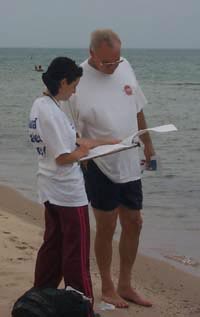Health and Environmental Effects Research
National Epidemiological and Environmental Assessment of Recreational Water Project Purpose
The purpose of the NEEAR study is to find out whether people stay healthy after a swim at the beach. This information will be compared with water pollution tests done during the same time and at the same beaches. The U.S. EPA initiated the NEEAR Water Study to test new water quality indicators and methods to see if they more accurately determine illnesses in swimmers. The final goal is to develop new guidelines that will help your state and local government and beach managers protect the health of beachgoers. They will be able to quickly check the water for signs of pollution and, if polluted, alert swimmers. Study Description
Expected Outcomes Scientists will use the information collected to formulate new guidelines for water quality. Because these new tests only take two hours or less, beachgoers can check beach conditions before they arrive at the beach. Results of beach water quality will be available to beach managers and individuals so they can make informed decisions. |
|||

